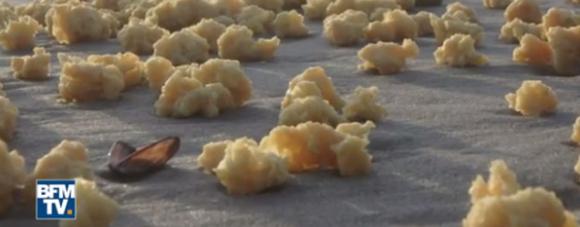 Not all oil pollution is petroleum. Recently, there have been reports of strange yellow blobs washing up on the beaches of France’s Opal Coast. The blobs described variously as “foamy balls,” “strange spongelike clumps,” “yellow mousse” and “possibly the biggest balls of earwax ever,” have been identified as industrial paraffin. Some speculate that the blobs which cover roughly 30km of the coastline may be the result of tank cleaning by a ship which had a cargo of paraffin.
Not all oil pollution is petroleum. Recently, there have been reports of strange yellow blobs washing up on the beaches of France’s Opal Coast. The blobs described variously as “foamy balls,” “strange spongelike clumps,” “yellow mousse” and “possibly the biggest balls of earwax ever,” have been identified as industrial paraffin. Some speculate that the blobs which cover roughly 30km of the coastline may be the result of tank cleaning by a ship which had a cargo of paraffin.
Over the last few years, what have been referred to as “fatbergs,” congealed blocks of palm oil, have been washing ashore from time to time on British beaches of Sussex, Kent, Cornwall, Devon, Dorset and Hampshire. While, so far posing no threat to humans, the fatbergs have proven deadly to dogs. Dogs like the smell of the palm oil but chunks can get caught in their throats, causing them to choke. Also the blocks of weathered palm oil become a home for a wide range of bacteria and toxins.
One celebrated example was the death of Zani, a black-haired mini-schnauzer, who was poisoned after eating a palm oil blob on Long Rock beach in 2013.
Where is the palm oil coming from? One case where the culprit was identified was that of the Maersk Kiera, caught dumping palm oil residue from tank cleaning within 12 miles of Cornwall beaches in 2012, not far from where Zani was later poisoned. The ship was nabbed by imagery from satellites operated by the European Maritime Safety Agency.
According to Intertanko, the vegetable oil trade represents close to 50 million tonnes of cargo annually. The palm oil trade represents some 60%, soybean oil some 20%, and sunflower seed 7%. Palm kernel oil, peanut oil, olive oil, cottonseed oil and coconut oil represent the remaining 23% of the market.
Malaysia and Indonesia each account for just under one-third of the vegetable oils exported each, Argentine some 15%, and Brazil some 5%. The biggest importing areas are Europe (9 m tonnes) China (7.5 m tonnes) and India 6 m tonnes), which together take about half the imports.
The world’s biggest vegetable oil trades are the transportation of palm oil from Malaysia and Indonesia. This market has increased from some 27.5 million tonnes in 2005 to 29.4 million tonnes in 2006. The largest part of this trade is carried out by tankers with double hulls, and this share increased from 53% in 2005 to 60% in 2006. The Malaysian export of palm oil is projected to increase from 12,634 million tonnes in 2004/05 to 13,770 million tonnes in 2005/06 and 13,840 million tonnes in 2006/07, according to the Malaysian Palm Oil Board.
What are the rules for tank cleaning of vegetable oils and paraffin? They have gotten significantly tougher in the last decade. Revisions to MARPOL Annex II, which went into force in 2007, require most vegetable oils to be carried in double hull tankers. It still allows some dumping when more than 12 miles offshore but also introduced strict stripping pump requirements to limit the amount of oil going over the side due to tank cleaning.
Ships constructed before 1986 are required to having pumps capable of stripping cargo so that a residue of no more than 300 liters remains in the tank and its associated piping. For newer ships the allowed residue drops to 75 liters. Based on the volume of oil washing ashore on French and British beaches, it appears that the latest rules are not being followed.
While new and stricter rules are important, as foamy balls & killer fatbergs wash ashore on European beaches from what seems likely to be illegal tank cleaning, the next challenge is enforcement.

Not just tankers.
Engineers battle
143-ton “total
monster” in London
sewer
https://www.cbsnews.com/
news/london-sewer-fatberg-
whitechapel-total-monster-
thames-water/